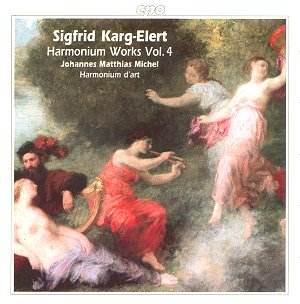Sigfrid KARG-ELERT (1877-1933)
Works for Harmonium, Volume 4.
Renaissance, Op. 57. Sicilienne, W10. 33 Portraits, Op. 101. Graduale,
W7a. Einsames Vogelein. Zwei Miniaturen. Zwei Sensibilismen. Zwei
Expressionismen.
 Johannes Matthias
Michel (harmonium
d'art).
Johannes Matthias
Michel (harmonium
d'art).
 CPO 999 631-2
[DDD] [two discs,
129'28]
CPO 999 631-2
[DDD] [two discs,
129'28]
Crotchet
Amazon
UK
Amazon
USA

This is, methinks, a release for a very specialised audience. The instrument
used, the harmonium d'art (also known as the Kunstharmonium) was popular
at the turn of the century, and between 1903 and 1915 Karg-Elert wrote in
excess of one hundred pieces for it, including a full-blown Sonata (1905).
The 33 Portraits (in two books) make up the vast majority of the playing
time here. This piece constitutes a virtuoso study in pastiche and moves
chronologically from the devotional Requiem aeternam (a la Palestrina)
and a jaunty Vilanella (in the style of Lassus), through a well-contrasted
threesome of Gluck (Overture) Haydn (Rondo) and Mozart (Fantasia) before
passing into the Romantic period culminating in Wagner (predictably, the
longest movement) and the shortest slow movement Bruckner never wrote (3
minutes 17 seconds). On, then, to representations of the early twentieth
century and the distinctly unmystic (though not for want of trying) Scriabin,
a not particularly recognisable Debussy and the final pièce de
résistence, Subtile Düfter der Wunderblume. True to the
spirit of one who enjoys playing games, this last is subtitled 'Onirot di
Alle-Ir-Bag'. Not Arabic (or even some turn of the century occultist jargon),
but the name of its dedicatee, just spelt backwards. It's all very sweet
the first time round, although even then the sheer length is daunting.
Interesting, also, to hear pastiches of composers not so well known today
(MacDowell and Sinding get a movement each). It has to be said, though, that
there is a surprisingly large array of sound combinations to be gleaned from
the harmonium d'art, and they are used to good effect here.
In the spirit of all this gamery, the final pieces after the Portraits
were published under pseudonyms: Baptiste Karg, Teo von Oberndorff, Wolfgang
Ey, Roderich Bergk and Dr Ottmar Bergk. The twittering of Einsames
Vögelein ('Oberndorff') is delicious and under the umbrella of
anonymity, the Zwei Expressionismen demonstrate Karg-Elert's more
experimental side.
The Portraits are preceded by Renaissance, Op. 57 (perhaps
not the most gripping start to the set, and perhaps better not to think too
much of funeral parlours) and the inconsequential and forgettable Sicilienne.
An interesting couple of hours' listening, but not to be taken in one go.
Michel is a committed interpreter.
Reviewer
Colin Clarke
Performance

Sound

